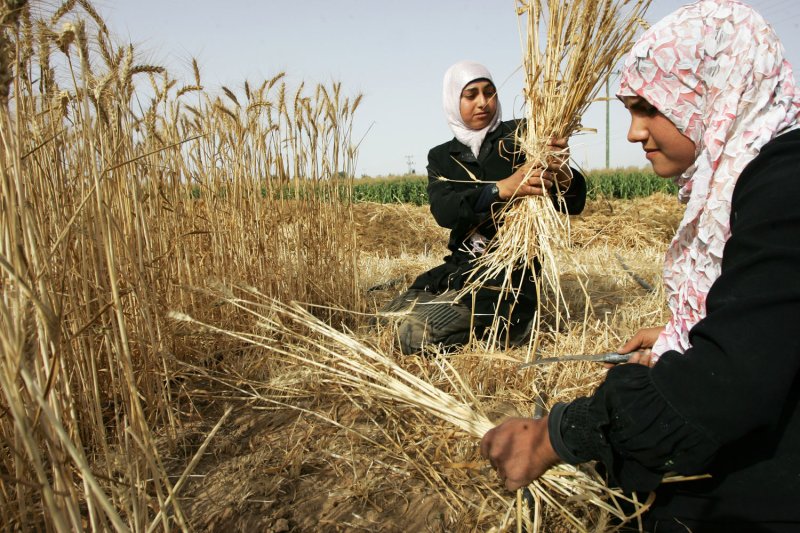Palestinian farmers collect wheat during the annual harvest season in Rafah, near the Israel border, in the southern Gaza. New research suggests early hunter-gatherers began impacting the evolution of the earliest wheat strains as early as 30,000 years ago in the Southern Levant. Photo by UPI/Ismael Mohamad |
License Photo
Oct. 23 (UPI) -- New research suggests hunter-gatherers began altering the evolution of the first crops some 30,000 years ago, 10,000 years earlier than previously thought.
Wild plants are genetically programmed to spread their seeds in the wild. Their seeds and seed pods break away and the casings become shattered, allowing the seeds to become naturally sowed. But when certain plants were selected on a large scale by early humans, they began the transition from plant to crop and evolved to retain their seeds.
New analysis of this genetic transition from wild to domesticated suggests the evolution of several ancient grain species was impacted by human selection practices as many as 30,000 years ago.
Scientists found evidence of "non-shattering" genes among the remains of einkorn, wild wheat, recovered from Tell Qaramel, an archaeological site in modern day northern Syria.
Researchers also analyzed the genes of rice recovered from South, East and Southeast Asia, as well as barley and emmer wheat from the Southern Levant.
Genomic analysis of ancient plant remains allowed scientists to build a timeline revealing the increasing frequency of non-shattering genes.
Their timeline confirmed the acceleration of plant domestication some 8,000 years ago, coinciding with the development of sickle farming technology. But the research -- detailed this week in the journal Philosophical Transactions of the Royal Society B -- showed the roots of domestication stretch much farther into the past, and that humans began altering the evolution of crops during a period of time regarded as inhospitable to farming.
The findings prove there were dense populations of people gathering plants on a large scale as early as 30,000 years ago.
"This study changes the nature of the debate about the origins of agriculture, showing that very long term natural processes seem to lead to domestication -- putting us on a par with the natural world, where we have species like ants that have domesticated fungi, for instance," Robin Allaby, a professor at the University of Warwick, said in a news release.















